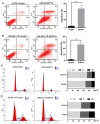NOP14 inhibits melanoma proliferation and metastasis by regulating Wnt/β-catenin signaling pathway
- PMID: 30484495
- PMCID: PMC6262753
- DOI: 10.1590/1414-431X20187952
NOP14 inhibits melanoma proliferation and metastasis by regulating Wnt/β-catenin signaling pathway
Erratum in
-
Erratum notice for: "NOP14 inhibits melanoma proliferation and metastasis by regulating Wnt/β-catenin signaling pathway" [Braz J Med Biol Res 2019;52(1):7952].Braz J Med Biol Res. 2022 Feb 4;55:e7952erratum. doi: 10.1590/1414-431X2021e7952erratum. Braz J Med Biol Res. 2022. PMID: 35137856 Free PMC article.
Abstract
Malignant melanoma is an aggressive skin cancer with a high mortality rate. Nucleolar protein 14 (NOP14) has been implicated in cancer development. However, the role of NOP14 in malignant melanoma progression remains largely unclear. In this study, we observed that malignant melanoma tissue showed NOP14 down-regulation compared to melanocytic nevi tissues. Moreover, we observed that NOP14 expression was significantly associated with melanoma tumor thickness and lymph node metastasis. NOP14 overexpression in melanoma cells suppressed proliferation, caused G1 phase arrest, promoted apoptosis, and inhibited melanoma cell migration and invasion. Further investigations revealed that NOP14 overexpression reduced the expression levels of Wnt3a, β-catenin, and GSK-3β of the Wnt/β-catenin pathway. In summary, we demonstrated that NOP14 inhibited melanoma cell proliferation and metastasis by regulating the Wnt/β-catenin signaling pathway.
Figures





Similar articles
-
The NOP14 nucleolar protein suppresses the function and stemness of melanoma stem-like cells through Wnt/beta-catenin signaling inactivation.Bioengineered. 2022 Mar;13(3):7648-7658. doi: 10.1080/21655979.2022.2050491. Bioengineered. 2022. PMID: 35282769 Free PMC article.
-
NOP14 regulates the growth, migration, and invasion of colorectal cancer cells by modulating the NRIP1/GSK-3β/β-catenin signaling pathway.Eur J Histochem. 2021 Jul 2;65(3):3246. doi: 10.4081/ejh.2021.3246. Eur J Histochem. 2021. PMID: 34218653 Free PMC article.
-
EMG1 interacts with NOP14 to regulate the growth, migration, and invasion of melanoma cells via the Wnt/β-catenin pathway.Transl Cancer Res. 2020 May;9(5):3669-3679. doi: 10.21037/tcr.2020.03.79. Transl Cancer Res. 2020. PMID: 35117729 Free PMC article.
-
[Nuclear beta-catenin localization is not sufficient for canonical Wnt signaling activation in human meianoma cell lines].Mol Biol (Mosk). 2011 Sep-Oct;45(5):884-91. Mol Biol (Mosk). 2011. PMID: 22393786 Russian.
-
The multidimensional role of the Wnt/β-catenin signaling pathway in human malignancies.J Cell Physiol. 2022 Jan;237(1):199-238. doi: 10.1002/jcp.30561. Epub 2021 Aug 25. J Cell Physiol. 2022. PMID: 34431086 Review.
Cited by
-
Integrated analysis of RNA-binding proteins in human colorectal cancer.World J Surg Oncol. 2020 Aug 22;18(1):222. doi: 10.1186/s12957-020-01995-5. World J Surg Oncol. 2020. PMID: 32828126 Free PMC article.
-
The NOP14 nucleolar protein suppresses the function and stemness of melanoma stem-like cells through Wnt/beta-catenin signaling inactivation.Bioengineered. 2022 Mar;13(3):7648-7658. doi: 10.1080/21655979.2022.2050491. Bioengineered. 2022. PMID: 35282769 Free PMC article.
-
Ankyrin repeat domain 1 is dysregulated in keloids and suppresses keloid fibroblast growth, migration, and extracellular matrix deposition.Cytojournal. 2025 Feb 13;22:17. doi: 10.25259/Cytojournal_111_2024. eCollection 2025. Cytojournal. 2025. PMID: 40134570 Free PMC article.
-
Investigation of the Ability of Crocin to Treat Skin Cancer Chemically Induced in Mice via the Inhibition of the Wnt/β-Catenin and Fibrotic Pathway.Cureus. 2023 May 5;15(5):e38596. doi: 10.7759/cureus.38596. eCollection 2023 May. Cureus. 2023. PMID: 37284388 Free PMC article.
-
Circular RNA hsa_circ_0075542 acts as a sponge for microRNA-1197 to suppress malignant characteristics and promote apoptosis in prostate cancer cells.Bioengineered. 2021 Dec;12(1):5620-5631. doi: 10.1080/21655979.2021.1967064. Bioengineered. 2021. PMID: 34515615 Free PMC article.
References
MeSH terms
Substances
LinkOut - more resources
Full Text Sources
Medical
Molecular Biology Databases

